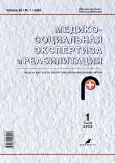Analysis of the need for rehabilitation measures for children with disabled living in boarding schools in Moscow
- Authors: Bolod S.O.1, Karasaeva L.A.2, Mechtanova Y.V.1
-
Affiliations:
- Main Bureau of Medical and Social Expertise in the Moscow Region
- St. Petersburg Institute of advanced training of doctors-experts
- Issue: Vol 26, No 1 (2023)
- Pages: 17-24
- Section: ORIGINAL STUDY ARTICLE
- URL: https://bakhtiniada.ru/1560-9537/article/view/148372
- DOI: https://doi.org/10.17816/MSER610626
- ID: 148372
Cite item
Abstract
BACKGROUND: The low efficiency in restoring impaired functions and overcoming of limitations in daily activity in children with disabilities living in children’s psychoneurological boarding houses in Moscow determined the relevance of the study.
OBJECTIVE: The study aimed to examine the contents of individual rehabilitation or habilitation programs developed in the Federal State Institution “Main Bureau of Medical and Social Expertise in the Moscow Region” of the Ministry of Labor of Russia for 2019–2021 for disabled children living in children’s psychoneurological boarding houses and determine the need for rehabilitation services to make changes and additions.
MATERIALS AND METHODS: The study included a population of disabled children in the Moscow’s children’s homes (n=843) (sources: certificates of examination, individual rehabilitation or habilitation programs for 2019–2021, and statistical reporting forms № 7-D [Sobes]). An analysis of the contents of individual rehabilitation or habilitation programs and the need for rehabilitation measures was conducted.
RESULTS: The contingent of children with disabilities living in children’s psychoneurological boarding houses included children with varying degrees of disability, resulting from persistent disorders impairing body function. The dynamics of 2019–2021 revealed need for complex rehabilitation, including medical, sociopsychological, and sociocultural rehabilitation measures.
CONCLUSION: The obtained data indicate the need to study ways to improve the effectiveness of rehabilitation measures to assess implementation results at each stage and their timely actualization.
Full Text
##article.viewOnOriginalSite##About the authors
Svetlana O. Bolod
Main Bureau of Medical and Social Expertise in the Moscow Region
Author for correspondence.
Email: bolod_so@msemo.ru
ORCID iD: 0000-0002-5765-7690
SPIN-code: 8838-5406
doctor of medical and social expertise
Russian Federation, MoscowLyudmila A. Karasaeva
St. Petersburg Institute of advanced training of doctors-experts
Email: ludkaras@yandex.ru
ORCID iD: 0000-0001-5621-0240
SPIN-code: 9544-3108
MD, Dr. Sci. (Med.), professor
Russian Federation, Saint PetersburgYulia V. Mechtanova
Main Bureau of Medical and Social Expertise in the Moscow Region
Email: mechtanov22@mail.ru
ORCID iD: 0000-0002-8293-3642
SPIN-code: 8243-3447
Russian Federation, Moscow
References
- The concept of development in the Russian Federation of a system of comprehensive rehabilitation and habilitation of persons with disabilities, including children with disabilities, for the period up to 2025, approved by Decree of the Government of the Russian Federation of December 18, 2021 № 3711-r. Available from: https://www.consultant.ru/document/cons_doc_LAW_405017/6610a41a9b2461132bf4adb30815ce32d1c1ad27/ (In Russ).
- The position of the disabled. Children’s disability. Available from: https://rosstat.gov.ru/folder/13964 (In Russ).
- Federal Law of Russian Federation № 181-FZ of November 24, 1995 “On the social protection of disabled people in the Russian Federation”. Available from: https://www.consultant.ru/document/cons_doc_LAW_8559/ (In Russ).
- The plan of the main activities carried out within the framework of the Decade of Childhood, for the period up to 2027, was approved by the order of the Government of the Russian Federation № 122-r of January 23, 2021. Available from: http://static.government.ru/media/files/3WkqE4GAwQXaIGxpAipFLmqCYZ361Kj0.pdf (In Russ).
- Bolod SO, Karasaeva LA, Mechtanova YV. The need for comprehensive rehabilitation of disabled children living in boarding schools in the Moscow region. In: V.S. Luchkevich, editor. Health of the population and quality of life: electronic collection of materials of IX All-Russian with international participation scientific-practical conference. St. Petersburg, 2022. Part 1. 400 p. Available from: https://www.consultant.ru/document/cons_doc_LAW_405017/6610a41a9b2461132bf4adb30815ce32d1c1ad27/ (In Russ).
- Klochko EY. Life without barriers: about prospects. Psychological Science and Education. 2016;21(1):94–107. (In Russ). doi: 10.17759/pse.2016210108
- Krivoruchko YuD, Filatkina NV. Peculiarities of the contingent of the psycho-neurological boarding school. Russian Psychiatric Journal. 2018;(6):41–42. (In Russ).
- Starobina EM, Gordievskaya EO, Kuzmina IE. Vocational orientation of individuals with regard to health limitations: a textbook. Moscow: Forum; 2021. 352 p. (In Russ).
- Shakhmuradova LI, Moiseeva RI. The problem of organizing career guidance in conditions of inclusive education: a collection of proceedings of the conference. Intern. scientific-practical. conf. “Social and pedagogical issues of education”; 2020 May 12; Cheboksary. Cheboksary: Publishing House “Sreda”; 2020. P. 31–34. (In Russ).
Supplementary files








